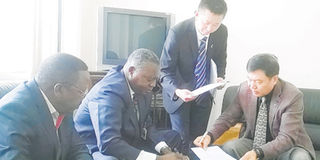China gives Sh432m for Burundi talks

Mr Gou Haodong, Minister Counsellor at the Chinese Embassy in Dar es Salaam, and the Director of Infrastructure at the EAC Secretariat, Mr Philip Wambugu, sign an agreement under which China is to give the EAC $200,000 to support the Burundi peace process. Looking on (standing) are Chinese embassy official Xia Riu Jiu and Dr James Njagu of the EAC Secretariat.
PHOTO | EAC
What you need to know:
- “Our commitment to the success of the Burundi peace process is there for all to see,” said Chinese embassy official Gou Haodong.
- He commended the EAC for playing a leading role in facilitating the talks whose facilitator is Retired President Benjamin Mkapa.
Arusha. China has donated $200,000 (Sh432 million) to the East African Community (EAC) secretariat to facilitate talks aimed at ending the political crisis in Burundi.
“Our commitment to the success of the Burundi peace process is there for all to see,” said Chinese embassy official Gou Haodong.
He commended the EAC for playing a leading role in facilitating the talks whose facilitator is Retired President Benjamin Mkapa.
Receiving the money on behalf of the EAC secretary-general, EAC Director of Infrastructure Phillip Wambugu thanked China for its support which had kept the talks going.
The 17th EAC Extraordinary Summit held in Dar es Salaam earlier this month directed the EAC secretariat to continue mobilising resources for the Burundi dialogue.
Mr Mkapa said during the summit that the process was facing various challenges, including shortage of funds.
“We have been almost entirely depending on the generous support of the European Union and China and I feel the need for Your Excellencies to consider providing more reliable financial resources,” he said.
The Inter-Burundi Dialogue has been wracked by hitches even before formal consultations started in May this year in Arusha.
During the EAC Council of Ministers meeting, which preceded the summit, the ministers urged all stakeholders in the conflict to take the ongoing mediation efforts seriously so that peace, security and stability could be restored in the country “in the shortest possible time”.
But the Burundi government has repeatedly insisted that it was not ready to negotiate with opposition politicians it accuses of being behind the trouble that started in April last year during which President Pierre Nkurunziza announced his intention to vie for a third term of presidency, which he later won in the elections held in July 2015.
The Bujumbura government, through its outspoken Minister for External Affairs, Allaine Nyamitwe, specifically objected the presence of three opposition politicians during the first phase of talks held in Arusha in May.
The second phase of the negotiations in July apparently faltered after the government maintained its hardline stance. It coincided with the shock killing of a prominent politician aligned with the government, Ms Hafsa Mossi, who was also a member of the East African Legislative Assembly (Eala).
Hundreds of people have lost their lives in Burundi since April last year in a politically-motivated killings while over 270,000 of them have fled to Tanzania and Rwanda as refugees. Many opposition politicians are also in exile within the EA region or abroad.



